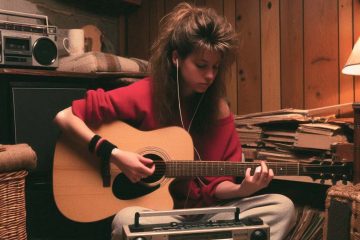Hopefully you’ve read the last post in the song writing tips series. It discusses developing a daily song writing habit. If you have read it hopefully you’ve actually been working on developing that habit.
Once you’ve developed your daily song writing habit, you need to start working smart with you songwriting practice. You do this by working out where to focus your practice.
I don’t know where you’re at in your song writing journey so I’m going to encourage you to do some self reflection. This is in the spirit of “teaching a man to fish” so you can learn to spot potential areas to focus your practice on.
So what should you focus your song writing practice on?
1. Identify Legitimate Weaknesses
This can be an easy one to spot and makes a big difference when you make it your focus. The big giveaway when it comes to weaknesses in your skills is that they are usually those parts of your songwriting process you dislike or avoid. It might be second verse lyrics or digging deeper into a melody or lyrics to refine it.
When you’re learning an instrument, people often love playing the bits they know and then fumble through the bits they don’t. You might play through the song five times and “say” you’ve been practicing but you ain’t foolin’ anyone.
The longer you put off practicing the things you don’t find easy the long you put off mastering those aspects of song writing. Whether you’re a seasoned pro or starting out. Learning to spot these weakness that you’re avoiding and approach them with deliberate practice will supercharge your songwriting.
Practical Song Writing Tips: Don’t make practicing the hard stuff a chore. Try and get in the headspace of looking forward to it. This is mdgsaking you a better song writer even when you feel incompetant – that’s the beauty of practice. Also limit how much time you spend on deliberate practice to avoid getting too discouraged. 10 mins per song writing session is enough.

2. Know When To Challenge Yourself
When you learn an instrument, practicing a new piece of music or an exercise can be frustrating at first. Curiously, as you persist you often unknowingly pick up new skills. These new skills actually don’t just help you to learn the piece that you’re practicing. They help all aspects of your playing.
The same goes for song writing so you need to always be challenging yourself. Find songs, sounds, parts that inspire you from other people’s music. Learn how to recreate those things which inspire you. This is like taking apart and examining something and teaches your about craft and craftsmanship.
You can also assimilate those inspiring things into the music you’re writing as well. The point is to add this challenge into your songwriting practice purposefully. Whether it’s setting up an exercise to copy something or purposefully assimilating those inspirations into your writing, it will challenge your current skills and help push you forward.
Practical Song Writing Tips: Try copying a section or whole song as a production in your DAW. Try to get the sounds, parts etc. that your inspiration track uses as close as possible to the original. This close study of the song will reveal things you never realised were going on before.
If you’re not a DAW user, listen to the song 5 times through. Write notes each time on eveything you’re hearing. Listen 2 times, take a break, listen and further 2 times, take a break, then listen a final time. This should really give you a deep insight into how the song is put together. This will help inform your own songwriting greatly.
3. Play It 80% Safe.
At times it can be tempting to colour in between the lines so your picture looks as good as someone else’s. And whilst you don’t want to look like you can’t colour at all, you need to still get creative and push outside the lines. It’s a fine balance.
One of the best ways I’ve heard it be described is by borrowing an idea from economics called “The Pareto Principle”. The Pareto Principle states that 80% of output comes from 20% of the actual producers (not music producers). (I’ve written another blog which goes into the Pareto principle in music in depth)
For our purposes we want to work with the idea that 80% of what is in a track should be recognisable/comfortable for a listener. 20% should be your unique take. This goes for your sound and songwriting.
NOTE: This isn’t a precise formula it is a concept. Put your calculator down (unless your writing math rock) and just look for those tweaks which are “your thing” in song writing.
You can be wildly outside the box but your chances of connecting with a large audience diminish. This doesn’t mean you can’t get crazy sometimes. But if you want to connect with more people you’ll need to use this guiding principle or run the risk of your music getting ignored …
Plus, once you have established some fans you have a little more flexibility in this regard. You can see this with a lot of artists that have a mainstream crossover hit. They find an audience and then make more eclectic music that their core fans will still enjoy.
For now, consider adding that 20% of “you” into the music you’re making.
Practical Song Writing Tips: Listen to any of the songs listed here. Examine their hooks. How many times does the hook appear and what percentage of the song does it make up. Look for other 80/20 type relationships that help to make the track unique.
If you want to make a useful comparison. Take songs by the same artist which sound similar from the same album which didn’t chart. Is there a noticeable 80/20 rule difference?
Where To Next?
There is a whole lot more we could talk about in regards to practicing song writing of course. The last two posts should give you a framework to start growing your songwriting skills. They should also help you to become aware of where and how to challenge yourself to improve. (I’ve also included some resources below for more on practicing.)
In the next post in this song writing tips series we’re going to talk about arrangement. This is the next fascinating aspect in preparing a release which won’t get ignored.
If you have any questions please leave them in the comments. I’d love to hear from you. If you found this post helpful, please share it with other.
Songwriting Practice Resources
- Designing The Perfect Practice Loop
- The Beginners Guide To Deliberate Practice
- Scott H Young Blog (Author of Ultralearning)
Photo by Soundtrap



0 Comments